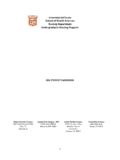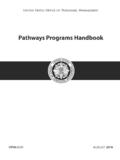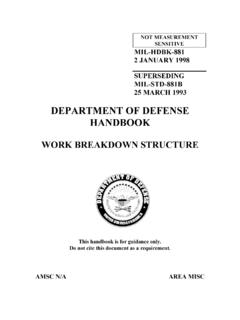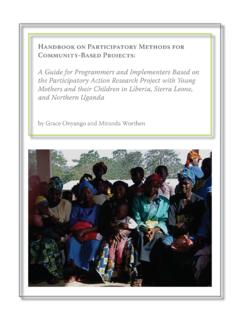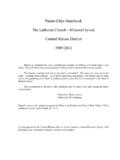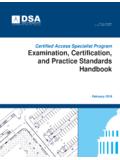Transcription of FAMILY NURSE PRACTITIONER - bilingualonline.net
1 FAMILY NURSE PRACTITIONER . Universidad del Turabo School of Health Sciences Nursing Department Master of Science in Nursing Program 1. TABLE OF CONTENTS. Page I. Introduction A. Welcome .. 3. B. Purpose of handbook .. 4. C. Program Accreditation and Memberships .. 4. D. The Nursing programs History .. 4. E. FNP Mission Statement .. 4. F. Definition of FNP .. 4. G. Description of FNP Program 5. H. Program Title .5. I. Program Duration ..5. J. FNP Program Schedule .. 6. K. FNP Program Philosophy ..6. L. FNP Curriculum ..8. M. FNP Graduate Profile 12. II. General Policies Student Responsibilities .. 14. Student Expectations.
2 14. Clinical Guidelines .. 15. Rules and Regulations .. 15. Academic Honesty ..16. Dress Code .. 18. Cell Phone Policy .. 18. III. Academic Policies Admission .. 23. Standards for Academic Progress .. 23. Graduation .. 24. Semester Load .. 24. Absences .24. Grades .. 25. Completion of Degree Requirements .. 25. Withdrawals .. 26. Incomplete (I) Grades .. 26. Preceptor Guidelines .. 27. Clinical Sites .. 28. Student Confidentiality Agreement .. 29. Clinical Eligibility Form .. 30. Clinical Log Consent Form .. 31. Clinical Log .. 33. Clinical Hour Tally Sheet .. 35. Across the Life Span Spread Sheet .. 37. Clinical Placements 38.
3 Soap Rubric .. 39. Student Self Evaluation .. 40. Student Evaluation of Preceptor and Clinical Site .. 41. Preceptor Evaluation .. 42. Faculty Evaluation of Clinical Site and Preceptor .. 44. Faculty Observed PE at Clinical Site of FNP Student .. 45. FNP Student Agreement .. 46. 2. ANA G. MENDEZ UNIVERSITY SYSTEMS. UNIVERSIDAD DEL TURABO. SCHOOL OF HEALTH SCIENCES. NURSING DEPARMENT. FNP STUDENT handbook . I. INTRODUCTION. A. Welcome Dear FNP Student: On behalf of the faculty and administrative staff at the School of Health Sciences, I would like to take this opportunity to welcome you to the FAMILY NURSE PRACTITIONER Program.
4 As future FNP's we understand that you will confront obstacles along this arduous journey, but it will be worthwhile as you focus and dedicate the time and energy needed to complete this program. Upon completion of this program of study, you will receive a Master of Science in Nursing (MSN) degree with a specialty in FAMILY NURSE PRACTITIONER . This will make you eligible to sit for the ANCC or the AANP National Board Certification Examinations. It is our ultimate goal to prepare you for this task in order for you to contribute as an excellent Advanced Practice NURSE at any primary care provider setting. In this handbook , you will find the FNP program academic policies, course descriptions, clinical protocols, rules and regulations and forms that you will need to complete all of your clinical experiences.
5 The transition process from BSN to an FNP primary care provider can be challenging but we are confident that you will be able to reach your professional goals. We wish you many blessings in your academic and professional endeavors. Sincerely, The FNP Program Faculty School of Health Sciences Universidad del Turabo PO Box 3030. Gurabo, PR 00778. Tel. (787) 743-7979 ext. 4015. Fax (787) 704-2703. 3. B. PURPOSE OF handbook . This handbook has been prepared as an orientation guide to policies, procedures, and other information specific to the FNP program. Information in this handbook is as accurate as is realistically possible; however, the contents may change periodically.
6 Due notice will be given to all students when changes are made to policies contained in the handbook . If there are questions about any of the information contained in this document, do not hesitate to contact us for clarification. Clinical forms are located in the back of this handbook . C. PROGRAM ACCREDITATION AND MEMBERSHIPS. The program has full accreditation through the Council on Higher Education in Puerto Rico, Middle States Association of Colleges and Secondary Schools and the Commission of Collegiate Nursing Education (CCNE). The Nursing Program holds membership in the American Association of Colleges of Nursing (AACN) and the National Organization of NURSE PRACTITIONER Faculties (NONPF).
7 D. THE NURSING programs HISTORY. In the year 1998, UT established the School of Health Sciences (SHS) with the goal of offering academic programs that satisfy the needs of the east central region of the Island. This effort started with the Bachelor in Nursing Sciences degree (BSN), in April 2000. At the graduate level, SHS started the Master's degree of Science in Nursing with a specialty in FAMILY NURSE PRACTITIONER in March 2004 and later added two other programs : MSN with a specialty in Occupational and Environmental Health Adult NURSE PRACTITIONER and MSN with a specialty as Clinical NURSE Leader. The MSN was reaccredited in November 2010-2015.
8 E. NURSING PROGRAM MISSION STATEMENT. The mission of the SHS is to prepare excellent human resources in the Health Sciences with innovative academic offerings across the curriculum who can respond properly and rapidly to the needs of local and global communities. With the current gaps in health care services, Puerto Rico needs well-trained advanced practice nurses and clinical NURSE leaders with increased knowledge and skills to provide primary care to those lacking high quality accessible health care; therefore students will be prepared to pass the FNP ANCC/AANP. National Board Certifications. The students in this FNP program will be encouraged to maintain a holistic perspective in the health care they provide with a multidisciplinary and collaborative focus throughout the individuals life span and increase access to health promotion, health prevention and primary care services, yet furthermore decrease morbidity and mortality in medically underserved low-income populations of Puerto Rico and globally.
9 F. Definition of FAMILY NURSE PRACTITIONER . FAMILY NURSE Practitioners provide health care services to individuals, families, groups of clients and communities, with an emphasis on health promotion, disease prevention and diagnosis and management of common and acute illnesses/injury and stable chronic diseases. Within their scope of practice they may order, conduct and interpret diagnostic and laboratory tests and prescribe pharmacologic and non-pharmacologic treatments. Educating and counseling individuals and their families regarding healthy lifestyle behaviors are also within 4. their scope of practice. The students in the FAMILY NURSE PRACTITIONER Academic Program are encouraged to maintain a holistic perspective in the health care they provide with a multidisciplinary and collaborative focus throughout the clients life span.
10 The Specialty in FAMILY NURSE PRACTITIONER in the academic program of Master of Science in Nursing is embedded in the empowerment theory. Zerwekh (1992) describes empowerment as a helping process that enables a person to take charge of his/her life and make choices and believe that the future may be influenced. Empowerment is fostered through mutual participation where the patient and provider have equal power. According to Drevdahl (1995), empowerment is both a process and an outcome. Participation in community activities creates change through critical thinking and dialogue that can lead to outcomes such as economic ventures, educational opportunities, political action, and access to health care services.
